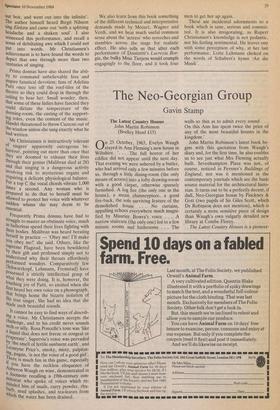Touching joy
Brian Masters
Prima Donna Rupert Christiansen (Bodley Head £15) rr he title of this book is apt yet in an odd way misleading, for it suggests a collec- tion of funny stories about the tantrums 0f imperious lumpish ladies. The reader is not denied hilarious anecdotes in their proper place, but Mr Christiansen's purpose in writing is deeper and more ambitious, te enable us to understand, through the careers of the world's finest operatic sing' ers from Mrs Tofts to the present day, the essence of their individual contributions. He succeeds admirably, combining enter- tainment and information to a degree which stirs one to make for the Covent Gardent box-office and seize some of this experience for oneself. The Art of the Prima Donna would have served him better. The history is divided thematically, with chapters on the sweet singing of the Victor- ians, the luscious tones of the 18th-centu1Y castrati, the overwhelming attack of the, Wagnerians, the emotional commitment or Italian verismo. The singers who have brought all this richness to the stage are as different from each other as Dickens i5 from Proust, but they have all had ie common the ability to astound. The voice produced by the castrato Farinelli was se perfect that the orchestra, for once literallY stunned, could not play. The American prima donna Mary Garden described hnvi a note `left Melba's body, left everything- and came over like a star and passed jut° our box, and went out into the infinite'. The author himself heard Birgit Nilsson sing Elektra and came out 'with a splitting headache and a shaken soul'. I also witnessed this performance, and recall a sense of debiltating awe which I could not put into words. Mr Christiansen's achievement is to have found the words to depict that awe through more than two centuries of singing.
Prima donnas have also shared the abil fly to command unbelievable fees and inspire fanatical devotion; fans of Adelina Patti once tore off the roof-tiles of the theatre so they could drop in through the ceiling to hear her. Small wonder, then, that some of these ladies have fancied they could dictate the temperature of the dressing-room, the casting of the support- ing roles, even the content of the music. Handel threatened to throw Cuzzoni out of the Window unless she sang exactly what he had written.
Mr Christiansen is instructively tolerant of singers' apparently outrageous be- haviour, pointing out more than once that they are doomed to exhaust their lives through their genius (Malibran died at 28) and that singing is a dangerous activity involving risk to mysterious organs and requiring a delicate physiological balance. Per a top C the vocal chords vibrate 1,000 times a second. Any woman who is Prepared to do that to herself must be allowed to protect her voice with whatever sudden whims she may deem to be essential.
F'requently Prima donnas have had to struggle to master an obstinate voice, much as ballerinas spend their lives fighting with their bodies. Malibran was heard berating herself in practice — 'Obey me! I'll make You obey me!' she said. Others, like the ,slipreme Flagstad, have been bewildered °Y their gift and professed simply not to understand why their throats effortlessly Performed wonders. Comparatively few (Schwarzkopf, Lehmann, Fremstad) have Possessed a strictly intellectual grasp of vv"at they were doing. It is, however, the touching joy of Patti, so excited when she first heard her own voice on a phonograph, that brings home the bizarre isolation of the true singer. She had no idea that she made such beautiful sounds.
It cannot be easy to find ways of describ- iq a voice. Mr Christiansen accepts the challenge, and to his credit never sounds arch or silly. Rosa Poncelle's tone was 'like a liquid that does not freeze or congeal or ,evaPorate'; Supervia's voice was pervaded °Y 'the smell of fertile sunburnt earth', and -eontyne Price's, smoky, misty, palpitat- T,g, Pagan, is not the voice of a good girl'. if 'ere is much fun in this game, especially You have the reckless eloquence of Auberon Waugh on wine, demonstrated in a footnote recalling a 19th-century con- noisseur who spoke of voices which re- bed him of snails, curry powder, rhu- a, rh, mud splashes, and tea-leaves from wnich the water has been drained. We also learn from this book something of the different technical and interpretative demands made by Mozart, Wagner and Verdi, and we hear much useful common sense about the 'actress' who screeches and stumbles across the stage for realistic effect. He also tells us that after each performance of Donizetti's Lucrezia Bor- gia, the bulky Mme Tietjens would crumple engagingly to the floor, and it took four men to get her up again.
These are incidental adornments to a book which is sane, serious and commit- ted. It is also invigorating, as Rupert Christiansen's knowledge is not pedantic, nor his feeling sentimental. He leaves one with some perception of why, at her last performance, Lotte Lehmann choked on the words of Schubert's hymn 'An die Musik'.















































 Previous page
Previous page